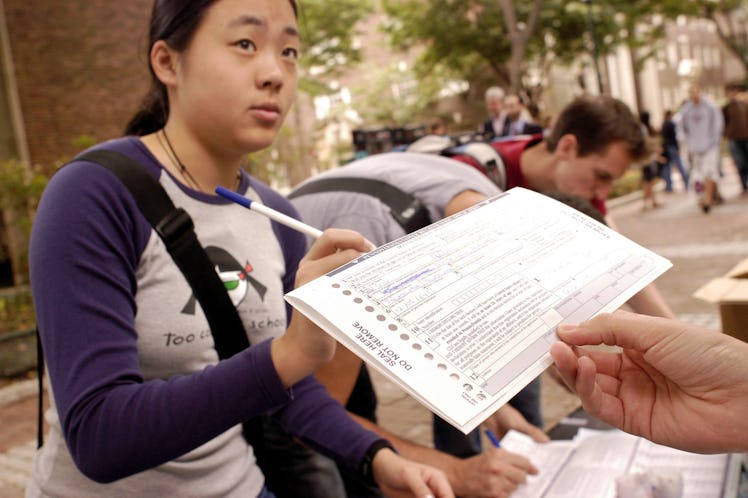
#MeToo Could Have A Big Impact On The Elections This Year, New Report Shows
On the heels of a massive wave of allegations that came out against former film mogul Harvey Weinstein, sexual misconduct has been the topic of the year. And voters don't seem to be letting it go anytime soon. It turns out that sexual misconduct is a big deal for voters, and #MeToo could affect the elections this year, as voters take to the polls for the 2018 midterm elections in November, according to a new report.
The #MeToo campaign, a movement started by Tarana Burke in 2007, called on survivors of sexual misconduct to share their stories to show how widespread the issue was. The movement took off with lightning speed in 2017, with countless users' responses showing how relevant the topic was to their lives. The movement doesn't appear to be a short-lived fad. Instead, a new report by the Barbara Lee Family Foundation suggests that voters have little tolerance for sexual harassment.
The survey, published in April, was conducted on a sample of 1,000 likely voters across the country. Per the report's findings, 52 percent of voters overall said that they wouldn't vote for someone accused of sexual harassment; that number was 53 percent for men overall and 73 percent for millennial women specifically.
Among millennial women surveyed, 65 percent said they wouldn't vote for a candidate who didn't prioritize addressing the issue of workplace harassment. Overall, 51 percent of voters shared that sentiment.
Additionally, the overwhelming majority of voters responded that a female candidate was much more favorable if she took a strong stance against harassment. In fact, 59 percent said they'd give the highest possibility favorability rating for a candidate who stated that "Perpetrators of sexual misconduct have no place in public office." What's more, 30 percent of respondents said that the recent events involving instances of sexual harassment against women made them more inclined to vote for a woman than for a man.
There's some evidence to suggest this finding has teeth. In a state where a Democratic win was next to impossible, voters in Alabama chose the progressive candidate Doug Jones over Republican Roy Moore, who had been accused of sexual misconduct with minors, though he'd denied these allegations.
A data analysis by FiveThirtyEight published in January 2018 shows that high-level harassment is resulting in unprecedented ramifications, and this extends to politicians. A startling number of politicians so far this congressional session have already resigned due to allegations of sexual harassment — something that had been historically rare. As of January of this year, the country had already seen more resignations in this Congress than in the previous 117 years, according to the FiveThirtyEight analysis. The analysis further showed that there were three mid-session resignations over sexual misconduct allegations from the end of 2017 through January 2018; this two-month number was shockingly close to the total of such resignations (five) from the previous 116 years combined.
Aside from influencing voter behavior, the #MeToo movement and the larger wave of momentum standing up to sexual misconduct and in defense of women's rights has prompted many women to simply run for office themselves rather than vote another man into office. And some, whether from their own experiences of sexual abuse or harassment or purely out of solidarity, made the decision to run as an act of resistance.
That sexual harassment accusations would be enough to dissuade voters signals a break with history. As a presidential candidate, Donald Trump had been accused of sexual harassment, assault, or other misconduct by numerous women (19 in all, after the fact of his election). Trump and his administration have denied all accusations of this. Leading up to the election, the infamous Access Hollywood tape surfaced, showing a 2005 Trump bragging about grabbing women by the genitals, which he later apologized for. Despite these and other instances, voters elected him. So the report's finding now runs counter to that outcome.
It's worth noting that polls aren't perfect, and how people interpret them can be even more imperfect. The primary season is just getting into full swing, and if the last couple of years has shown us anything, it's that a lot can change in six months.
But as the resignations of politicians since the presidential election has shown us, this tolerance for harassment by high-powered politicians may be changing. Whether an authentic change in voter mentality has taken place since November 2016 — not just du-jour support for the #MeToo trend — will become apparent on election day.